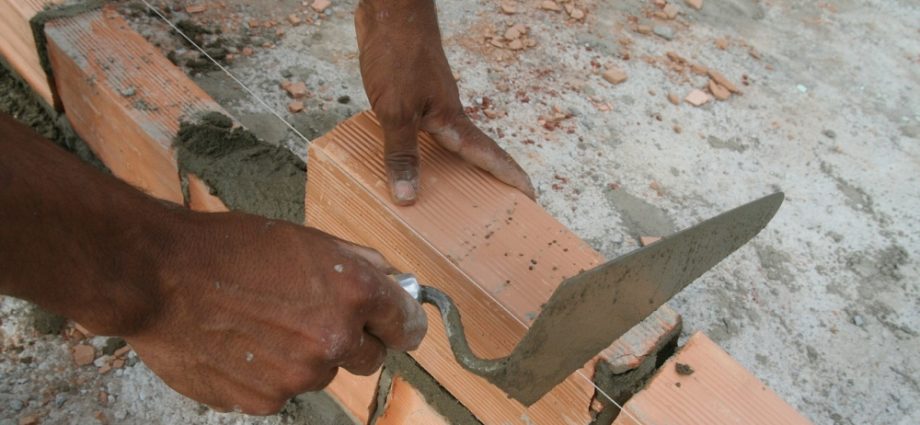Protection
Bricking the house against the happy
jaws of wolves, my father and his
tawny hired man, backs drawn deep
in conspiracy, slapped mortar onto trowels,
eyes migrating to as distance beyond
clouds. Heat swam around them, requiring
the huge delusion of some believable
project to produce it. Neither spoke
but nodded in words at the last best
effort of amateurs to make the obstinate
foreheads of bricks stack cautiously against
shadows brooding at length. There was
nothing lovelier – and I measured happily
the tidewater of their progress each
evening in a squat. It was not until
the hateful face of a man, his straw
head catching the fire of an idea, came
armed with the dregs of a solution,
that I knew, beyond the useless
intelligence of stars, how forgiveness
is a scandal.
He and his kind, chiseled at right angles,
stepped off the distance daintily, rust
streaking from the mouth of one taking
time to adjust his sights after spitting.
They stood their ground in plain view
of my father and his laborer lathering
bricks more cautiously now. My games
of whirling circles had become tiresome
and I’d sat at a finished corner, staring
from behind jellies of ignorance at a scene
that invited no explanation. My father,
hammering the last brick into a fracture
whose clean break satisfied a precise
geometry of stone, tottered once before
leaping from a ledge of his own making.
The grass seemed to part at his advance.
From my own vantage I saw his ankles
wreathed in clover sown to multiply
sparse hair brooding above the earth’s
bald spot, knob actually, upon which he
rose and stood, feeding his feet to the
ground’s solid appetite for shifting stances.
He never moved from that place of
origins but stared at the sunrise faces
of neighbors whose cracked design
he could read at a glance.
With the practiced aplomb of a man
aware of being discussed in his own presence,
the hired man continued to cull all but
the smoothest of edges, taking in his mouth
a little whistle of wind with no place
left to blow. He knew he was helpless
toward that; nor did he have the face
for turning away from compulsory discovery
that he’d become one man’s matter
of principle without mattering as fact.
He failed to blink – mistake, I thought then
if but for refusing to leave himself a
margin of error, a loophole into which
I somehow watched the years fall in
at a glance.
Amid a sense of circling, my father squatted
equidistant from the hub’s edge at which
his neighbors drew the line, narrowing
the orbit in downward staring. He was,
I assumed from this distance, without
protection, waiting only for the hive to
swarm with dangers too many-sided
to see at once. From the faces of pale
saints, my eyes travelled to the wall
where all I’d become became lost in
the indisputable pattern of bricks.
Fear tugged me back to one spot, splitting
my line of vision in halves. With a
face in each direction, I could not
find, for the life of us, a place to
hide. My father’s strategy seemed no
strategy at all. He only seemed to want
to listen, as if the first duty of living
was that and nothing more. Only
when I noticed how the words n—-r and
nervous surfaced like dead catfish
from the implacable depths of a face
born without light of its own, did I
see the flash of a hope unfold before
widening eyes.
It appeared so suddenly it might have
been there all the time, though no amount
of practicing could have produced it. One
by one the shadows yielded, gave up
the tiniest of exhuberant ground trembling
with the uncertainty at all my father
had yet to do. He whittled – threat
enough – shaving twig bark into a pencil
with which he underscored a message
of his own: “If anything happens I’ll
kill all you sons of bitches.”
No one heard the love in that but I.
One by one they trailed their leader,
crept by me, walked the fine line
of creatures going about their business
without meaning to. At my father’s
side the knife found its pocket once
more. Eyes scanned to catch me
curved against a tree whose only
sound was the throat of a bird
clinging to twigs. I wondered if
worry would get the best of me,
then saw my father with both hands
stack the last of the rock-solid themes.
That night I did not sleep so well
as I would need. For though the
house was sure to stand its ground
against storms, I heard my mother
say that fire was just outside the
window within our neighbor’s reach.
It was enough to draw my father
to my side where he would tell me,
above the clacking of an old fan
wedged snugly in the corner, how no one
wanted trouble for long and how
all would soon forget the words
whittled like the teeth of a wolf.
It was a hope to which I happily
conceded, though what I knew from
the practiced vigil I’d begun to inherit
was how my father’s one unforgiveable
eye refused the plea of sleep.
**Featured image by Celio Silveira from Pixabay

PROTECTION is another reason to follow all of your writings! Thank you!